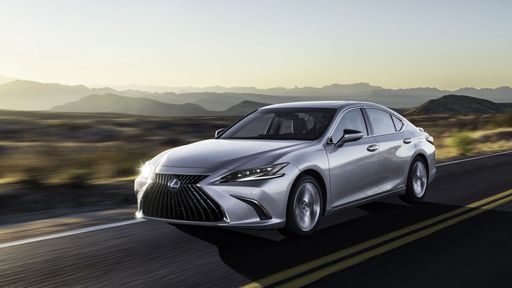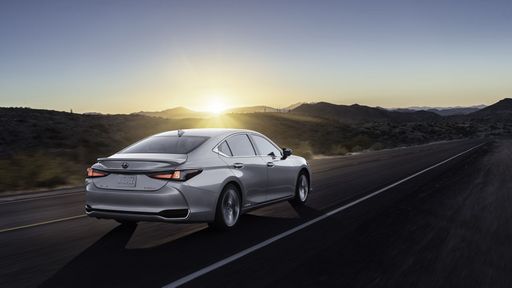Hyundai Tucson vs Lexus ES - Differences and prices compared
Compare performance (252 HP vs 218 HP), boot space and price (30600 £ vs 46600 £) at a glance. Find out which car is the better choice for you – Hyundai Tucson or Lexus ES?
Costs and Efficiency:
When it comes to price and running costs, the biggest differences usually appear. This is often where you see which car fits your budget better in the long run.
Hyundai Tucson has a significantly advantage in terms of price – it starts at 30600 £, while the Lexus ES costs 46600 £. That’s a price difference of around 15951 £.
Fuel consumption also shows a difference: Hyundai Tucson manages with 1 L and is therefore significantly more efficient than the Lexus ES with 5.10 L. The difference is about 4.10 L per 100 km.
Engine and Performance:
Power, torque and acceleration are the classic benchmarks for car enthusiasts – and here, some clear differences start to show.
When it comes to engine power, the Hyundai Tucson has a somewhat edge – offering 252 HP compared to 218 HP. That’s roughly 34 HP more horsepower.
In acceleration from 0 to 100 km/h, the Hyundai Tucson is a bit quicker – completing the sprint in 7.90 s, while the Lexus ES takes 8.90 s. That’s about 1 s faster.
In terms of top speed, the Hyundai Tucson performs to a small extent better – reaching 204 km/h, while the Lexus ES tops out at 180 km/h. The difference is around 24 km/h.
Space and Everyday Use:
Beyond pure performance, interior space and usability matter most in daily life. This is where you see which car is more practical and versatile.
Both vehicles offer seating for 5 people.
In curb weight, Hyundai Tucson is slight lighter – 1542 kg compared to 1680 kg. The difference is around 138 kg.
In terms of boot space, the Hyundai Tucson offers clearly perceptible more room – 620 L compared to 454 L. That’s a difference of about 166 L.
When it comes to payload, Hyundai Tucson to a small extent takes the win – 545 kg compared to 470 kg. That’s a difference of about 75 kg.
Who comes out on top?
Overall, the Hyundai Tucson shows itself to be wins the duel decisively and secures the title of DriveDuel Champion.
It convinces with the more balanced overall package and proves to be the more versatile choice for everyday use.

Hyundai Tucson
Costs and Consumption
View detailed analysis
Engine and Performance
View detailed analysis
Dimensions and Body
View detailed analysis
Hyundai Tucson
Hyundai Tucson marries bold, sculpted looks with a clever, roomy cabin that feels smarter than its price tag suggests. It's composed on the road, easy to live with day-to-day, and a sensible choice for buyers who want SUV style without the showroom theatrics.
details




Lexus ES
The Lexus ES delivers a supremely comfortable, quietly luxurious experience that favors serene cruising over sporting theatrics. It wraps everyday practicality, top-notch build quality and unimpeachable reliability in a handsome, grown-up package that will appeal to buyers who prize calm refinement over headline-grabbing excitement.
details



|

|
|
|
|
Costs and Consumption |
|
|---|---|
|
Price
30600 - 46300 £
|
Price
46600 - 59300 £
|
|
Consumption L/100km
1 - 7.6 L
|
Consumption L/100km
5.10 L
|
|
Consumption kWh/100km
-
|
Consumption kWh/100km
-
|
|
Electric Range
64 - 70 km
|
Electric Range
-
|
|
Battery Capacity
-
|
Battery Capacity
-
|
|
co2
22 - 172 g/km
|
co2
115 g/km
|
|
Fuel tank capacity
42 - 54 L
|
Fuel tank capacity
50 L
|
Dimensions and Body |
|
|---|---|
|
Body Type
SUV
|
Body Type
Sedan
|
|
Seats
5
|
Seats
5
|
|
Doors
5
|
Doors
4
|
|
Curb weight
1542 - 1889 kg
|
Curb weight
1680 kg
|
|
Trunk capacity
546 - 620 L
|
Trunk capacity
454 L
|
|
Length
4510 - 4535 mm
|
Length
4975 mm
|
|
Width
1865 mm
|
Width
1865 mm
|
|
Height
1650 mm
|
Height
1445 mm
|
|
Max trunk capacity
1721 - 1799 L
|
Max trunk capacity
-
|
|
Payload
523 - 545 kg
|
Payload
470 kg
|
Engine and Performance |
|
|---|---|
|
Engine Type
Diesel MHEV, Plugin Hybrid, Petrol, Full Hybrid
|
Engine Type
Full Hybrid
|
|
Transmission
Automatic, Manuel
|
Transmission
Automatic
|
|
Transmission Detail
Dual-Clutch Automatic, Automatic Gearbox, Manual Gearbox
|
Transmission Detail
CVT
|
|
Drive Type
Front-Wheel Drive, All-Wheel Drive
|
Drive Type
Front-Wheel Drive
|
|
Power HP
136 - 252 HP
|
Power HP
218 HP
|
|
Acceleration 0-100km/h
7.9 - 11.6 s
|
Acceleration 0-100km/h
8.90 s
|
|
Max Speed
180 - 204 km/h
|
Max Speed
180 km/h
|
|
Torque
250 - 379 Nm
|
Torque
-
|
|
Number of Cylinders
4
|
Number of Cylinders
4
|
|
Power kW
100 - 185 kW
|
Power kW
160 kW
|
|
Engine capacity
1598 cm3
|
Engine capacity
2487 cm3
|
General |
|
|---|---|
|
Model Year
2024 - 2025
|
Model Year
2024
|
|
CO2 Efficiency Class
E, B, F, D
|
CO2 Efficiency Class
C
|
|
Brand
Hyundai
|
Brand
Lexus
|
What drive types are available for the Hyundai Tucson?
Available configurations include Front-Wheel Drive or All-Wheel Drive.
The prices and data displayed are estimates based on German list prices and may vary by country. This information is not legally binding.
